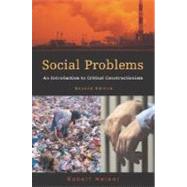
| An Introduction to the Sociology of Social Problems | |
| The Sociological Perspective | |
| Critical Constructionism | |
| Non-Sociological Philosophies | |
| The Cross-Cultural and Global Perspectives | |
| Corporate America | |
| The Media | |
| The Homogenization of Culture | |
| Summary | |
| Inequality | |
| The ""Booming"" Economy | |
| The Gap Between the Rich and the Rest | |
| The Plight of the American Worker | |
| Poverty | |
| Race and Inequality | |
| Global Inequalities | |
| Application: The Gross Domestic Product | |
| Summary | |
| Problems of the Family | |
| The Family in Historical Perspective | |
| The Family of the 1950s | |
| The Current State of the Family | |
| Children, Our Most Precious Resource? | |
| Application: ""Children Having Children"" | |
| Summary | |
| Crime and Deviance | |
| Universality and Relativity | |
| The Cultural Production of Knowledge About Crime | |
| Crime Scares | |
| Street Crime | |
| The American Punishment Frenzy | |
| Application: Street Violence vs. Corporate Violence | |
| Summary | |
| Problems of the Environment | |
| Technology and the Environment | |
| Scientific Uncertainty | |
| Corporate Suasion | |
| Consumerism | |
| Inequality and the Environment | |
| Global Inequality | |
| Application: Overpopulation | |
| Summary | |
| Conclusions | |
| Notes | |
| Table of Contents provided by Publisher. All Rights Reserved. |
The New copy of this book will include any supplemental materials advertised. Please check the title of the book to determine if it should include any access cards, study guides, lab manuals, CDs, etc.
The Used, Rental and eBook copies of this book are not guaranteed to include any supplemental materials. Typically, only the book itself is included. This is true even if the title states it includes any access cards, study guides, lab manuals, CDs, etc.